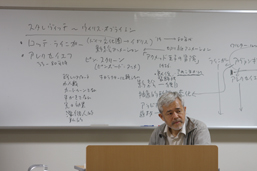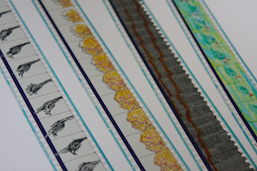- ABOUT US
- FINE ARTS
- MUSIC
- FILM AND NEW MEDIA
- GLOBAL ARTS
- ADMISSION
-
FACILITIES
- Global Support Center
- University Library
- The University Art Museum
- Public Collaboration Center
- Training Center for Foreign Languages and Diction
- Sogakudo Concert Hall
- Performing Arts Center
- Center of Creative Inheritance for the Future
- Art Media Center
- Health Care Service Center
- University Hall
- Gymnasium
- Hisao & Hiroko TAKI PLAZA
- Geidai Platform of Arts and Knowledge for the Future (Geidai PARK)
- Center for Curatorial Studies
- Geidai Art Plaza
- Toride Campus
- Yokohama Campus
- Senju Campus
- STUDENT ACTIVITIES
DOCTORAL PROGRAM IN FILM AND NEW MEDIA STUDIES
Department/course summary
 In our current era, cinematic expression and technological innovations are propelling each other forward and evolving, and we are faced with a demand for artists and researchers capable of organically synthesizing the broad range of knowledge pertaining to film and new media. Film and New Media Studies as a discipline responds to this demand by focusing on the pursuit of contemporaneous expression using film and media and the development of the necessary creative techniques and technology. Furthermore, society at large expects this field to elucidate the role of film and new media in culture to demonstrate its development potential and transform insights once privy only to creators into publicly accessible knowledge.
In our current era, cinematic expression and technological innovations are propelling each other forward and evolving, and we are faced with a demand for artists and researchers capable of organically synthesizing the broad range of knowledge pertaining to film and new media. Film and New Media Studies as a discipline responds to this demand by focusing on the pursuit of contemporaneous expression using film and media and the development of the necessary creative techniques and technology. Furthermore, society at large expects this field to elucidate the role of film and new media in culture to demonstrate its development potential and transform insights once privy only to creators into publicly accessible knowledge.
Curriculum
 Curriculum (graduate education and research)
Curriculum (graduate education and research)
In the doctoral course, the curriculum is composed from a point of view dedicated to the building of a new “pragmatic knowledge”, focusing on vision and experience of what “creating” is all about in the field of visual media. Research supervision, similarly to the Master’s course, is based on an individual direction and follow, adapted to each student’s project and level of ability. This course also promotes a stepping in as early as possible to an international carrier as a researcher, by focusing, in as well as outside Japan, on presentations and papers at academic societies, on the sending of works to events and exhibitions, and on internships and artist-in-residence programs.




